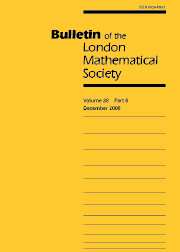No CrossRef data available.
Article contents
BEARDON'S DIOPHANTINE EQUATIONS AND NON-FREE MÖBIUS GROUPS
Published online by Cambridge University Press: 01 May 2000
Abstract
Let μ be a real number. The Möbius group Gμ is the matrix group generated by
formula here
It is known that Gμ is free if [mid ]μ[mid ] [ges ] 2 (see [1]) or if μ is transcendental (see [3, 8]). Moreover, there is a set of irrational algebraic numbers μ which is dense in (−2,2) and for which Gμ is non-free [2, p. 528]. We may assume that μ > 0, and in this paper we consider rational μ in (0, 2). The following problem is difficult.
formula here
Let [Gscr ] denote the set of all rational numbers μ in (0, 2) for which Gμ is non-free. In 1969 Lyndon and Ullman [8] proved that [Gscr ]nf contains the elements of the forms p/(p2 + 1) and 1/(p + 1), where p = 1, 2, …, and that if μ0 ∈ [Gscr ]nf then μ0/p ∈ [Gscr ]nf for p = 1, 2, …. In 1993 Beardon [2] studied problem (P) by means of the words of the form ArBsAt and ArBsAtBuAv, and he obtained a sufficient condition for solvability of (P), included implicitly in [2, pp. 530–531], by means of the following Diophantine equations:
formula here
- Type
- NOTES AND PAPERS
- Information
- Copyright
- © The London Mathematical Society 2000




